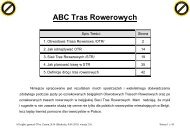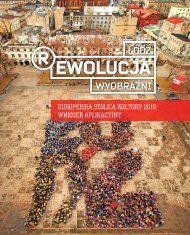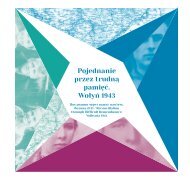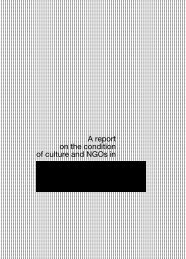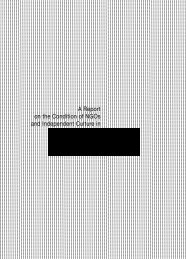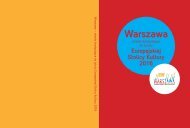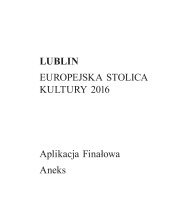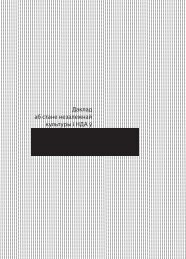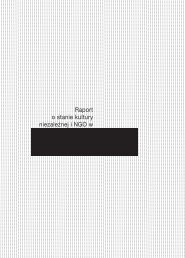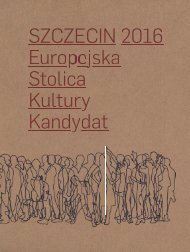Lublin 2016 â Appendix - Kultura Enter
Lublin 2016 â Appendix - Kultura Enter
Lublin 2016 â Appendix - Kultura Enter
Create successful ePaper yourself
Turn your PDF publications into a flip-book with our unique Google optimized e-Paper software.
ECC <strong>2016</strong> in locAL MEDIA<br />
<strong>Lublin</strong>, for some commentators from the beginning a dark horse in the competition, did not rest on its laurels<br />
after the successful first round. It continues its hard battle for victory, what is well reflected by the city’s<br />
highest media exposure in the analysed time period. <strong>Lublin</strong> had also the highest number of positive<br />
articles published in the media.<br />
“COOLTURAL CITIES European Capital of Culture <strong>2016</strong>.<br />
The Image of the Candidates present in the Media from December 2010 to February 2011”<br />
eCC <strong>2016</strong><br />
in locAL MEDIA<br />
In the final stage of the competition for the title of the European Capital of Culture <strong>Lublin</strong> has proven<br />
that it can maintain not only the high interest of the media, but also the professional level of the debate.<br />
The city has the highest number of press articles concerning ECOC (what was confirmed by the reports<br />
prepared by the PRESS-SERVICE “COOLTURAL CITIES European Capital of Culture <strong>2016</strong>”)<br />
and enjoyed the biggest interest of the media (according to the research conducted by the Institute of<br />
Media Monitoring called “Competition for ECOC <strong>2016</strong>, what Happened in the Media after the Announcement<br />
of the Short List. Analysis of the Candidates’ Media Exposure on the Basis of Press, Radio<br />
and TV Publications”).<br />
Interest of <strong>Lublin</strong> media was reflected not only in the high number of both informative and analytical articles<br />
that were published. Journalist played an important role in the creation of <strong>Lublin</strong>’s application for<br />
the title of ECOC by encouraging their readers to take part in the discussion, quoting the comments that<br />
were posted on websites and initiating public debate. <strong>Lublin</strong> editorial team of Gazeta Wyborcza organized<br />
a series of open debates concerning the most important points of the city’s application: Remembering<br />
and Anticipation, City and its Region, Towards the East, Culture of Knowledge, Civic <strong>Lublin</strong>, inviting<br />
both members of the Culture 2020 Team and independent experts, some of whom are: Tomasz Pietrasiewicz<br />
(The “Grodzka Gate – NN Theatre” Centre, leader of the theme Remembering and Anticipation),<br />
prof. Monika Adamczyk-Garbowska (Head of the Department of Jewish Culture and History<br />
of MCSU), Grzegorz Kuprianowicz (President of <strong>Lublin</strong> Ukrainian Association), Tomasz Dostatni<br />
OP, Marcin Wroński (writer of retro detective novels about <strong>Lublin</strong>) and rev. Dariusz Chwastek (parish<br />
priest of the Evangelical Church of the Augsburg Confession in <strong>Lublin</strong>), dr Irina Lappo (expert in the<br />
field of theatre, MSCU), Ewa Kozdraj (President of the Association “For Earth” which conducts workshops<br />
for refugees), rev. Stefan Batruch (parish priest of the Greek Catholic Church in <strong>Lublin</strong>, organizer<br />
of the European Days of Neighbours), Andrzej Kokowski (archaeologist, MSCU), Jan Bernad (Artistic<br />
Director of the “Crossroads” Centre), Tadeusz Pałka (film director) Piotr Franaszek (Representative<br />
of the Local Self-government).<br />
“Afisz” Cultural TV Programme of the local public television used a similar format. Once a month the<br />
programme became a platform for discussions about the future of <strong>Lublin</strong> culture in the context of our<br />
participation in the competition for ECOC title. Some of the guests who took part in the TV discussion<br />
panels are: Jerzy Onuch (curator, Adam Mickiewicz Institute, New York), Roman Hankiewicz (art historian,<br />
Lviv Art Council “Dialogue”), Grzegorz Rzepecki (leader of the theme Towards the East, Director<br />
of the Workshops of Culture), Grzegorz Józefczuk (journalist, writes about cuture for Gazeta Wyborcza<br />
<strong>Lublin</strong>), Magdalena Kawa (political scientist, MSCU), Piotr Celiński (media theoretician, leader of the<br />
Culture of Knowledge studio), Andrzej Kokowski (archaeologist, MSCU), Włodzimierz Wysocki (Deputy<br />
Major of <strong>Lublin</strong>, Major’s Plenipotentiary for European Capital of Culture), Krzysztof Czyżewski<br />
(Artistic Director of the European Capital of Culture <strong>Lublin</strong> <strong>2016</strong> project, Karolina Rozwód (Director<br />
of the Stary Theatre), Anna Machocka (The Municipality of <strong>Lublin</strong> City), Janusz Opryński (theatre director,<br />
Provisorium Theatre), Piotr Choroś (Homo Faber Association). Numerous programmes and reports<br />
on the state of our preparations, interviews conducted with Leon Tarasewicz, Robert Kuśmirow-<br />
88



